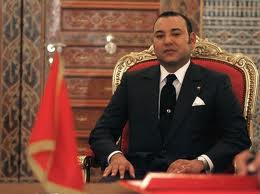The National.ae
Elizabeth Dickinson
 Morocco’s King Mohamed VI has started a tour of four Gulf states and Jordan, as the North African country seeks support in weathering an economic squeeze
Morocco’s King Mohamed VI has started a tour of four Gulf states and Jordan, as the North African country seeks support in weathering an economic squeeze
At the same time, according to forecasts by the International Monetary Fund, Morocco’s GDP growth is expected to drop from 4.9 per cent to 2.9 per cent this year.Morocco’s two strongest industries, tourism and agriculture, are down this year, largely attributed to regional unrest, the euro crisis and insufficient rains. That, together with the cost of subsidising basic goods such as fuel and food, will raise the country’s budget deficit to roughly 7.5 percent of GDP, more than double the average 3 per cent of the past decade.
King Mohamed, who arrived in Saudi Arabia yesterday and will also visit the UAE, Kuwait and Qatar, is expected to seek support for a roughly US$1 billion dollar-denominated bond issue set to float in November. He is also expected to solicit direct foreign investment, including a stake of up to 44 per cent of the national airline, Royal Air Maroc.
The trip is the latest indication of growing ties between the Gulf Cooperation Council countries and Morocco and Jordan, both of whom were invited to join the GCC last year.
“Morocco is one of the two remaining monarchies standing. It has had its protests but has emerged from Arab Spring relatively unscathed,” said Ayesha Sabavala, an analyst at the Economist Intelligence Unit. “The Gulf countries have been keen to be seen as supporting these two remaining monarchies.”
In a cooperation agreement signed last year, GCCcountries pledged a combined $2.5bn to Morocco and Jordan over the next five years.
Much of the assistance has yet to arrive, and a statement from the Moroccan Press Agency said this would be a key topic of discussion at the king’s first destination, Saudi Arabia.
Gulf aid has become increasingly important for Morocco in recent months, particularly as investment from the European Union has stagnated, economists say.
Despite boasting the fastest growth in the region in 2011, a combination of domestic spending and a weak international economy have widened trade and budget deficits.
Subsidies, kept high amid regional unrest, are another strain on the country’s finances. Local newspapers in Morocco reported this week that the country would not significantly reduce subsidies on fuel and other basic goods this year, as had been expected.
The Gulf countries can provide a crucial ingredient to stabilising Morocco’s economy, said Steffen Hertog, who studies the Gulf at the London School of Economics: “They can make money available.”
Analysts suggest Morocco will be looking for investment in sectors ranging from housing and construction to agriculture, with the emphasis on job creation.
A few such investments are under way. Qatar last year signed agreements with Morocco to invest $2 billion in development projects. Kuwait’s Fund for Arab Economic Development is also supporting a high-speed rail project worth $25 million in its initial phase.
edickinson@thenational.ae
.







